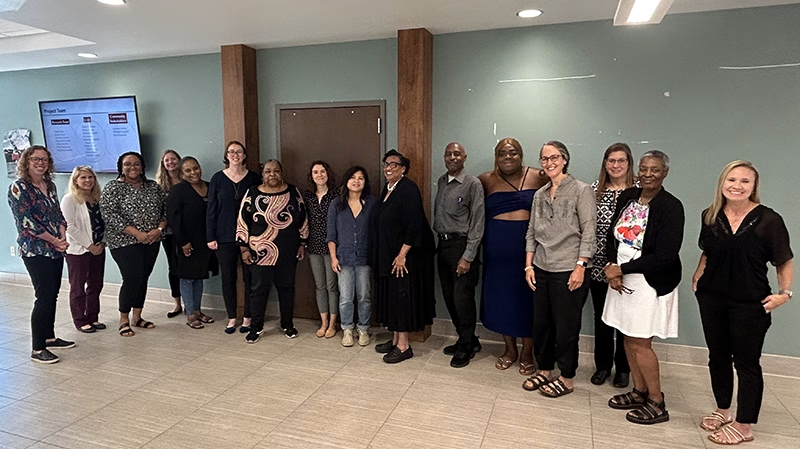Funding from an ICTR Pilot Award played a key role in setting the stage for a $10 million Patient-Centered Outcomes Research Institute (PCORI) grant recently awarded to a team of UW–Madison researchers and their partners. The PCORI grant funds a five-year study to determine which treatments tailored for Black adults are most effective at empowering those adults to stop smoking.
The project is led by principal investigators based at the UW Center for Tobacco Research and Intervention (UW-CTRI): Dr. Megan Piper (UW-CTRI Co-Director of Research) and Dr. Hasmeena Kathuria (UW-CTRI Director).
Activities for the PCORI study will span five states, including some metropolitan areas where there are elevated rates of smoking among Black adults. In Wisconsin, activities will focus on Milwaukee.
Read UW-CTRI’s news release for greater detail about this study and the five states in which activities will take place.

Members of the Community Advisory Board and scientific team for the project gather.
ICTR’s role
Early support from the UW Institute for Clinical and Translational Research (ICTR) helped the team get this work off the ground, design interventions, and be well-positioned to seek larger funding to carry out the next phase of the work. “It would not have happened without the support of ICTR in so many ways,” said Dr. Piper.
Piper was the lead investigator on a 2023 ICTR Stakeholder and Patient Engaged Research (SPER) Pilot Award. Funding for this award was provided by the UW School of Medicine and Public Health from the Wisconsin Partnership Program through a grant to ICTR. Piper’s project was titled “Reducing Racial Disparities in Smoking: The Milwaukee Collaboration.” (The SPER award has since been renamed the Patient Engaged Partnership Research, or PEPR, Pilot Award.)
This ICTR funding mechanism supports projects that generate useful, real-world applications of interventions and facilitate the dissemination and uptake of research findings. It stresses the meaningful involvement of patients, caregivers, clinicians and other healthcare partners throughout the research process.
In designing their project, Piper and the team were motivated by Wisconsin’s racial disparities in smoking rates and the lack of culturally specific interventions to help Black adults stop smoking (as well as scant literature on this topic). In Wisconsin, the percentage of Black adults who smoke is three times higher than white adults.
The research team hoped all along that their ICTR grant would pave the way for PCORI support, and now it has—allowing them to take their work to the next level and, ultimately, improve the health of Black adults across the country.
Noted Piper, “ICTR support was essential to getting this PCORI grant. There is no way we would have been able to do everything that we did without the SPER grant… We had a research question, and we knew we wanted a PCORI grant, which is very patient-centered. We also had partners that wanted to work with us, but what we really needed was a community advisory board to work with us to develop the interventions and identify outcomes that are important to members of Black communities.”
ICTR support allowed the team to develop a Milwaukee-based community advisory board of public health professionals and people with lived experience with cigarette smoking who provided key input and perspectives that the researchers themselves did not have.
Dr. Kat Phelps and Kim Neuschel, RN, of the Wisconsin Network for Research Support (WINRS) provided critical assistance in convening and facilitating the community advisory board, which met regularly for 11 months. “I could not have done what Kim was able to deliver,” said Piper of Neuschel’s assistance. “She helped with stumbling blocks early on, and she was able to help pivot and address issues in way that strengthened the group instead of derailing the project.”
The ICTR pilot award also supported focus groups that provided valuable feedback to the community advisory board and scientists on which treatment components and communication strategies were likely to resonate with Black adults—or, conversely, be unsuccessful or off-putting.
Real-world testing of the strategies formulated by the team is the focus of the PCORI-funded phase of the work (taking place in the five targeted states).
Also during the ICTR-supported phase of the work, Piper and her team took advantage of the collaboration planning service offered by ICTR’s Team Science program. Collaboration planning is an evidence-based intervention that helps research teams develop strong relationships from the beginning of a project by addressing potential areas of conflict before they arise. (Those interested in taking advantage of collaboration planning may visit the ICTR website to learn more and fill out an intake form.)
In October 2024, Piper and fellow team members shared their experiences to date in a panel at the annual Short Course organized by ICTR’s Dissemination & Implementation Launchpad.
To learn more about this valuable research, visit the UW-CTRI website.
Funding for this project was provided by the UW School of Medicine and Public Health from the Wisconsin Partnership Program (WPP 5129) through a grant to the UW Institute for Clinical and Translational Research. ICTR also receives funding from NIH-NCATS Clinical and Translational Science Award (CTSA) UL1TR002373.